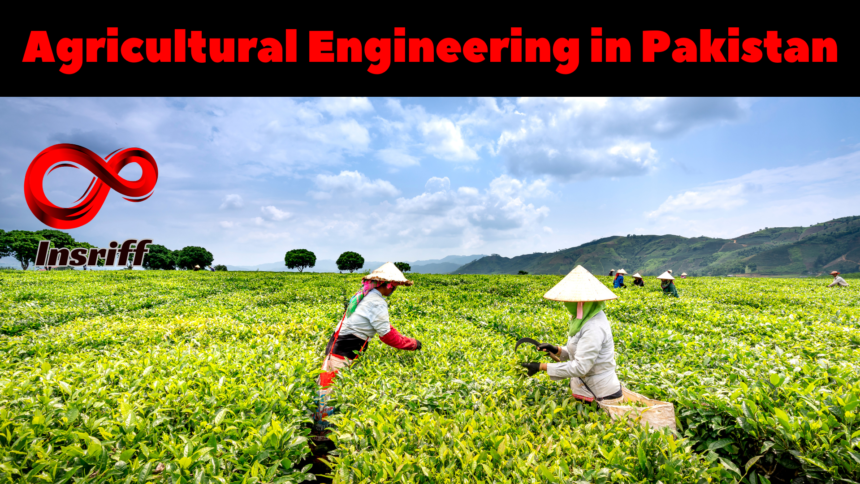Agricultural engineering in Pakistan is geared towards optimizing farming practices, specifically focusing on the efficient production and management of hay. This field plays a role in enhancing sustainability and productivity, ensuring the sector’s growth and adaptability to modern technologies. Its scope extends to developing innovative solutions for hay cultivation and processing, vital for Pakistan’s agricultural landscape.
In Pakistan, agricultural engineering is important for economic growth as it contributes one-quarter (22.25%) to the country’s GDP and employs a large population. The scope of agricultural engineering in Pakistan includes cultivating diverse crops and applying protocols for animal farming.
The Scope of Agricultural Engineering in Pakistan
Agricultural engineering is a growing profession in Pakistan. It focuses on studying, researching, and developing technologies for food cultivation.
Career Opportunities:
The scope of agricultural engineering covers various fields such as agronomy, agricultural engineering, and technology. It is gaining popularity nationwide due to multiple job options.
Mechanization:
Agricultural engineering designs and implements farm machinery to reduce manual labor and enhance overall efficiency in different farming processes. This has increased the demand for agricultural engineers in various fields across the country.
Crop Processing:
Agricultural engineers and scientists are directly responsible for increasing crop yields, improving farming methods, developing new plant varieties, and addressing environmental concerns. They also contribute to developing effective plans and equipment to boost the production of in-demand crops like timothy hay.
Livestock Feeding:
Agricultural engineers help optimize domestic animal’s feed. They provide advice on cultivating and using forage crops such as alfalfa hay and timothy hay. This enhances overall farm productivity.
Economic growth:
In Pakistan, agriculture is a primary source of income for many in rural areas. The export of crops, grown in Pakistani soil with unique capabilities, contributes significantly to the economy by supplying crops that are not naturally found in other countries.
Opportunities in Agricultural Engineering in Pakistan:
Agricultural engineering has significant scope in Pakistan’s engineering fields, with numerous top-ranked universities offering diverse courses related to agriculture. The government actively creates employment opportunities with competitive salaries to encourage students to participate in agricultural courses and contribute to increased production and economic growth.
A degree in agricultural engineering opens ways for professionals to make substantial contributions to the country’s development and elevate the quality of horticulture. The incorporation of innovative technologies and biotechnology methods increases productivity and opens doors for crop diversification, such as alfalfa hay and timothy hay, offering new opportunities for farmers.
Roles of Agricultural Engineer in Pakistan:
Agricultural engineers increase horticulture and husbandry production through the following innovative ideas and practices:
- They introduce and implement modern technologies on farms, ensuring their proper use and maintenance.
- Engineers actively engage in research to develop new methods that enhance agricultural productivity and sustainability.
- Agricultural engineers in Pakistan empower farmers to adopt best practices in farming by offering training and education in the use of modern machinery and techniques.
- They focus on issues like soil conservation and water management, making a significant contribution to eco-friendly farming.
- The engineers design and implement advanced irrigation systems to address water scarcity issues and optimize water usage in agriculture.
- They present various methods to alleviate environmental impacts and soil infertility, such as soil erosion and water pollution.
- Agriculture engineers use advanced biotechnological methods to develop disease-resistant varieties and improve overall crop-yielding quality.
- The engineers ensure healthy animal production, particularly poultry, fish, and dairy animals.
Challenges face by Agriculture Engineers in Pakistan:
Pakistan is an agricultural country with over 65% of its population involved in farming. However, it currently faces various challenges in the field of agricultural engineering.
Increasing Population:
As Pakistan’s population grows fast, agricultural engineers are struggling to meet the increasing demand for food. The challenge lies in balancing resources with the surging need for nutrition.
Irrigation Management:
Water scarcity significantly impacts both irrigation and cattle management in Pakistan. Water systems irrigate only 28% of the land and the rest depend on rain. This reliance makes the agricultural sector sensitive to climate change and inadequate water management.
Awareness Issues:
The level of mechanization in Pakistani agriculture is relatively low. As many farmers are still using traditional and old methods for farming practices. There is a need for the adoption of modern agricultural techniques and equipment to improve productivity and efficiency.
Limited Financing Options:
In Pakistan, many small-scale farmers lack the financial resources to purchase modern machinery and use advanced agricultural methods. They are unable to make necessary investments due to limited access to loans.
Land Scarcity:
Urban expansion, industrial projects, and infrastructure development are often built upon agricultural land. This competition for land not only reduces the overall agricultural area but also intensifies the struggle for fertile and well-irrigated land among agricultural engineers and farmers.
Conclusion:
In Pakistan, agricultural engineering is vital for improving and modernizing farming practices. It focuses on soil, water, plants, and animals, offering solutions to enhance overall production. Understanding its scope helps address challenges and embrace benefits, ensuring thriving agriculture for food security, economic growth, and a healthier environment.









